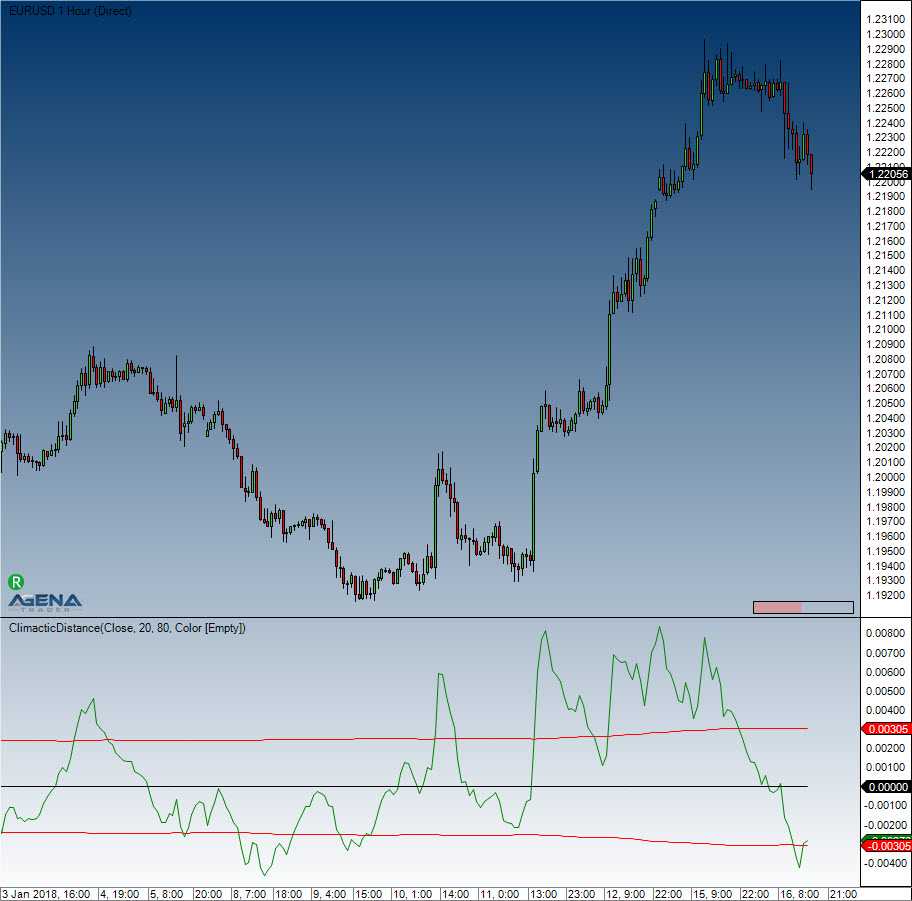Climactic Distance
Description
Calcualtion
More information
Usage
ClimacticDistance(int sMAPeriod, int thresholdPercent)
ClimacticDistance(IDataSeries InSeries, int sMAPeriod, int thresholdPercent)
ClimacticDistance(int period, int tresholdPercent, Color climacticColor)
ClimacticDistance(IDataSeries InSeries, int sMAPeriod, int thresholdPercent, Color climacticColor)
//Upper band
ClimacticDistance(int sMAPeriod, int thresholdPercent).Upper[int barsAgo]
ClimacticDistance(IDataSeries InSeries, int sMAPeriod, int thresholdPercent).Upper[int barsAgo]
ClimacticDistance(int period, int tresholdPercent, Color climacticColor).Upper[int barsAgo]
ClimacticDistance(IDataSeries InSeries, int sMAPeriod, int thresholdPercent, Color climacticColor).Upper[int barsAgo]
//Lower band
ClimacticDistance(int sMAPeriod, int thresholdPercent).Lower[int barsAgo]
ClimacticDistance(IDataSeries InSeries, int sMAPeriod, int thresholdPercent).Lower[int barsAgo]
ClimacticDistance(int period, int tresholdPercent, Color climacticColor).Lower[int barsAgo]
ClimacticDistance(IDataSeries InSeries, int sMAPeriod, int thresholdPercent, Color climacticColor).Lower[int barsAgo]
//MovingAverage
ClimacticDistance(int sMAPeriod, int thresholdPercent).MovingAverage[int barsAgo]
ClimacticDistance(IDataSeries InSeries, int sMAPeriod, int thresholdPercent).MovingAverage[int barsAgo]
ClimacticDistance(int period, int tresholdPercent, Color climacticColor).MovingAverage[int barsAgo]
ClimacticDistance(IDataSeries InSeries, int sMAPeriod, int thresholdPercent, Color climacticColor).MovingAverage[int barsAgo]
//Distance
ClimacticDistance(int sMAPeriod, int thresholdPercent).Distance[int barsAgo]
ClimacticDistance(IDataSeries InSeries, int sMAPeriod, int thresholdPercent).Distance[int barsAgo]
ClimacticDistance(int period, int tresholdPercent, Color climacticColor).Distance[int barsAgo]
ClimacticDistance(IDataSeries InSeries, int sMAPeriod, int thresholdPercent, Color climacticColor).Distance[int barsAgo]Return value
Parameters
Visualization

Example
Last updated